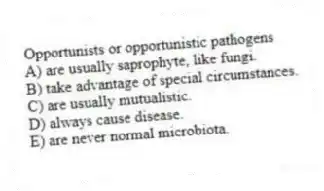
Opportunists or opportunistic pathogens
A) are usually saprophyte, like fungi.
B) take advantage of special circumstances.
C) are usually mutualistic.
D) always cause disease.
E) are never normal microbiota.
Correct Answer:
Verified
Q3: The series of steps used to connect
Q4: The microorganisms that are regularly found in
Q5: The infectious dose
A) is the same for
Q6: Which of the following members of the
Q7: The interaction of all organisms within a
Q9: Growth of a parasitic organism in or
Q10: The suffix -emia means in the
A) body.
B)
Q11: Which of the following is NOT True
Q12: The symbiotic relationship wherein both partners benefit
Q13: Newborn babies acquire microbiota
A) when passing through
Unlock this Answer For Free Now!
View this answer and more for free by performing one of the following actions

Scan the QR code to install the App and get 2 free unlocks

Unlock quizzes for free by uploading documents